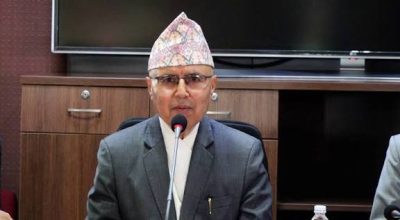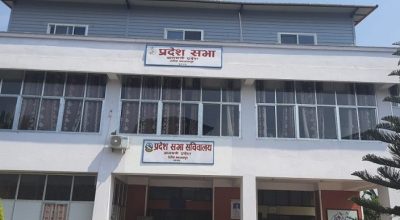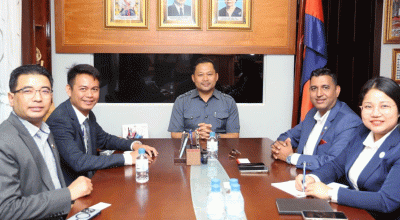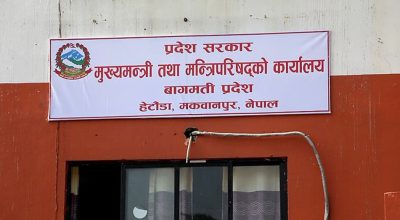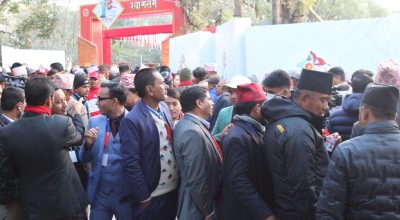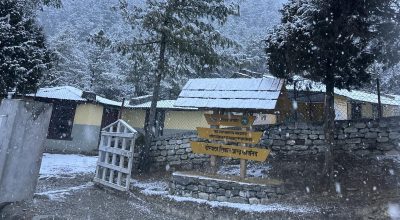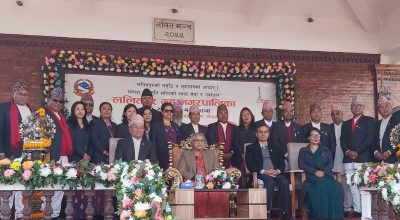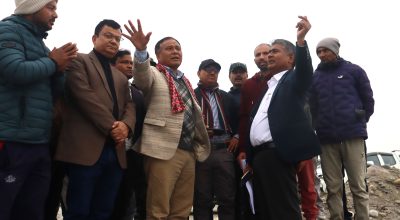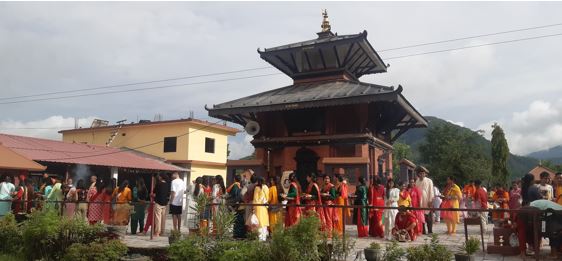
Basudev Paudel
Pokhara, July 22: Shukla Gandaki (Seti Gandaki), also known as the Seti river, is considered a sacred river in the oriental theology. The Shukla Gandaki river and various Dhams (holy places) connected with the river civilisation on the river banks have held important significances. One of the Dhams along the river banks is the Muktinath Chyawan Dham. Located near Gachhepani of Shuklagandaki Municipality-2 in Tanahun along the Prithivi Highway, the Dham is being developed as an important pilgrimage site in the past one decade.
The government at the local and provincial level has taken the initiatives in developing the Dham as a holy place. Besides, the local people have also contributed their efforts in developing the holy place as a religious tourist destination, said local peoples.
It is believed that Chyawan sage did penance at this place in the ancient times. Based on this belief, the place has been developed as a Chyawan Dham, said Homnath Lamsal, chair of the Muktinath Shuklagandaki Chyawan Dham Development Committee.
The place is being developed as the famous religious place, Muktinath Temple situated in the Muktinath Valley in Mustang, a district across the mountains, which can be reached through the banks of the Kaligandaki river. As a result, its glory and dignity are increasing, he said.
The Chyawan Dham is being developed as a common pilgrimage site for both Hindu and Buddhist followers just like Muktinath Temple which is a common holy place for the followers of both Hinduism and Buddhism, he said. Local people took a collective participation in the preservation of the Dham and its land since 2065 BS. Rishiguru Shreeram Paudel received that land as a place for meditation and spiritual practices while meditating in Muktinath in 2067 BS, it has been told.
The idea of constructing a temple in this Dham had developed acting on the Guru’s experiences during meditation and the situation of the place, and a Mahayagya was organised accordingly, he said. The Mahayagya that took place on March 24-31, 2011 aimed to collect funds to construct a temple in the Dham. Over Rs 14 million was collected from the Mahayagya, and the amounts were used in the construction of the Shukleshwor Mahadev Temple, a Chyawan monastery, an old-age home, a Mokshya Kunda, and other infrastructures, he said.
Besides the Shukleshwor Mahadev Temple, temples of gods Surya, Bishnu and Ganesh, and goddess Durga have been constructed. Additionally, 108 water spouts that have been constructed to resemble the Muktinath Temple, and the scene of the Annapurna mountain range are captivating.
The Gandaki provincial government provided Rs 2.2 million three years ago to manage the 108 streams, he said. Arrangements have been made for devotees to take a bath at the 108 streams, and worship at the 108 peepal trees, and the 108 Shivalingas, he said.
Lately, a large number of devotees from surrounding places of Tanahun and Kaski districts has visited the place, said the committee member Santosh Sapkota. Devotees throng the religious place during occasions and festivals like the Nepali New Year, Mondays in the Nepali month of Shrawan, Bala Chaturdashi, and Shivaratri, according to him.
The committee has built various infrastructures resembling the Muktinath Temple targeting those devotees and people, who cannot visit the Muktinath Temple due to various reasons, he said.
There is a belief that childless couple will get children after worshipping at the Shukleshwor Temple at the Chyawan Dham.
Cow conservation centre to preserve Dham
A cow conservation centre has come into operation in the area for the conservation of the Chyawan Dham. The Muktinath Shuklagandaki Dham has overseen the management of the cow conservation centre at Bharetara of Shuklagandaki Municipality-9.
“As per the decision of the municipality executive meeting on 5 April, 2023, the Dham will take care of the cow conservation centre. The centre has a total of 137 cows at present,” said Lamsal.
Initiatives have been taken in constructing a bridge over the Seti river with a long term plan of developing the cow conservation centre and the Chyawan Dham as ‘Gokul’ and ‘Mathura’, he said.
On the management of the cows in the centre, he said monetary assistances and feeders have been received from donors.
The municipality has managed two employees for taking care of the cows in the centre. In Hinduism, the cow is considered a sacred animal symbolizing wealth, motherly love and strength. Milk and urine of the cow is believed to have a purifying effect on human body, and are used as sacred things during rituals and occasions.
Dham connecting religious tourism
The Millennium Trek connecting Dulegauda of Tanahun and Rambachha of Syangja will link the Chyawan Dham. Having been included in the map of the Rock Garden trail, the Millennium Trek Management Committee will soon incorporate the Dham in its map this time, said the management committee general secretary Harka Gurung. “We aims to link the Dham with the trek taking into accounts its religious and touristic importance. The trek starting from Dulegauda will connect with the Chyawan Dham and the Rock Garden,” he said.
It takes around one week to complete the 72 kilometers trail, and there is the increasing attraction of both domestic and foreign trekkers. and tourists, he said.
The Chyawan Dham Development Committee has been organising various rituals like Rudri and conducting Bolbam festival in the Nepali month of Shrawan ever year to expose the religious importance of the Dham, and attract devotees and tourists alike, said Sapkota.
Bhagawat Manjari Radhika Dashi Jee Maharaj is scheduled to recite Shiva Puran story alongside a Shivaleela tableau from July 24 to 31, he said. Fifty percent of the money saved from the donations collected from the Mahayagya will be spent on the operation of the cow conservation centre, and the remaining on the construction of a crematorium, a Gurukul, and a building used for social work, it has been said.
Plan afoot to construct resting place for pilgrims
The Chyawan Dham Development Committee has come up with a plan to construct a resting place for devotees and religious tourists in the area, said Lamsal. An old-age home has also come into operation in the area. Although 168 ropanis of land belongs to the Dham, it is using only 37 ropanis. There is a need to protect the land belonging to the Dham, he said. RSS





